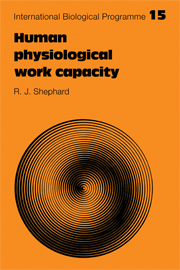Book contents
- Frontmatter
- Contents
- Foreword
- Preface
- 1 Introduction
- 2 Sampling and population studies
- 3 Methods for the measurement of physical fitness, working capacity and activity patterns
- 4 Climate, season and local geography
- 5 Socio-economic status and working capacity
- 6 Working capacity and constitution
- 7 The physical working capacity of the athlete
- 8 The growth of working capacity
- 9 Age and working capacity
- 10 Epilogue
- IBP Human Adaptability section publications
- References
- Index
- Frontmatter
- Contents
- Foreword
- Preface
- 1 Introduction
- 2 Sampling and population studies
- 3 Methods for the measurement of physical fitness, working capacity and activity patterns
- 4 Climate, season and local geography
- 5 Socio-economic status and working capacity
- 6 Working capacity and constitution
- 7 The physical working capacity of the athlete
- 8 The growth of working capacity
- 9 Age and working capacity
- 10 Epilogue
- IBP Human Adaptability section publications
- References
- Index
Summary
The concepts of physical fitness and working capacity
Physical fitness and working capacity are both elusive concepts. After several days of vigorous discussion, an expert committee of the World Health Organization (Andersen et al., 1971) was able merely to state the interrelationship of the two variables: ‘physical fitness is the ability to perform muscular work satisfactorily’. The present author has viewed fitness as an exercise in human ecology – the matching of the individual to his environment, physical, social and psychological (Shephard, 1969a, 1974a). As such, it stands central to the human adaptability theme of the International Biological Programme (IBP). In many primitive societies, physical fitness and an associated high level of working capacity have had survival value. Until the advent of western civilization, the strength and endurance of the individual provided the principal energy resource for the cultivation of crops and/or the capture of game; furthermore, unless the energy yields of field and chase matched the demands of growth, reproduction, body heating and the continuing quest for food, a community was doomed to early extinction.
Physical fitness and evolution
One might thus anticipate that an unacculturated primitive society would be marked by an evolutionary pressure favouring the survival, mating and successful rearing of children by the more resourceful males – those members of the tribe with a capacity for long and arduous physical work, able to perform the elemental tasks of agriculture, hunting and fishing in a particularly skillful and efficient manner.
Information
- Type
- Chapter
- Information
- Human Physiological Work Capacity , pp. 1 - 8Publisher: Cambridge University PressPrint publication year: 1978
